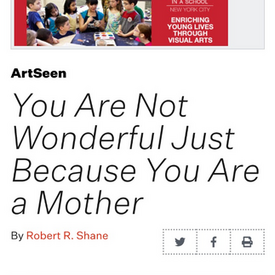PRESS / FEATURES
Exhibition Review in "The Brooklyn Rail"
Robert R. Shane, review of "You Are Not Wonderful Just Because You Are a Mother" exhibition in the Brooklyn Rail magazine. Featuring my Infertile Platitudes of Embodied Emptiness, Sonogram Series of 9
01/04/2021


ArtSeen in The Brooklyn Rail by Robert R. Shane
Link to full text article with images: https://brooklynrail.org/2021/04/artseen/You-Are-Not-Wonderful-Just-Because-You-Are-a-Mother

You Are Not Wonderful Just Because You Are A Mother exhibition
In an interview about her complicated relationship with her mother, artist Ishiuchi Miyako quipped, “You are not wonderful just because you are a mother.” Using this as the title for the second annual Artist/Mother Podcast exhibition, juror and curator Qiana Mestrich takes up the problematic fact that a woman’s social value is often determined by whether or not she is a mother. Because the first annual exhibition—Painting at Night, juried by Allison Reimus and reviewed in these pages last year—focused on affirming the value of unseen maternal labor, the doubts raised by Miyako might seem at odds with an Artist/Mother Podcast project. However, many artist/mothers have shared her sentiment. The journey to motherhood can be a difficult one marked by infertility struggles and pregnancy loss, difficult relationships with one’s own parents, and postpartum body image concerns, all of which are treated in the video, performance documentation, photography, mixed media work, and sculpture included in this exhibition.
Miriam Schaer addresses the ideology of motherhood in artwork that is about not being a mother, examining, in the artist’s words, “how women without children fare in a world that values women largely for their fertility.” On view is one of the 18 pieces from her series Babies (Not) On Board (2012–14), which consists of children’s rompers embroidered with insensitive comments about childlessness. (The rompers clothed realistic dolls and child mannequins in Schaer’s most well-known photo series, The Presence of Their Absence: Self-Portraits (2014).
Sally Butcher’s Infertile Platitudes of Embodied Emptiness (2020) uses a similar strategy to critique outsider responses to in vitro fertilization. Butcher inked her abdomen, pulled prints, and then manipulated them digitally to look like the flattened cone shape of an ultrasound image, captioning each one with a well-meaning but insensitive response to infertility struggles. Each of these is accompanied by her parenthetical commentary: “‘Thinking positively and your body will follow’ (Unproductive)” or “‘Oh, you can have one of mine’ (Impoverished).”
Margaret Curtis makes public the private—and often invasive—moments of a woman’s reproductive health in her sculpture Charm Bracelet of My Reproductive Career (2020). Charm bracelets with children’s birthstones make for popular Mother’s Day gifts, but this oversized bracelet includes a home pregnancy test, a syringe, and a tampon, all about life-size; a young girl sitting anxiously on an exam table, titled First Pelvic; and an adult woman in gynecological stirrups. Other charms refer to C-sections, pregnancy loss, termination, and IVF. Curtis’s circular chain begins to suggest how these private experiences are repeated in countless women’s lives, and from generation to generation. Intergenerational relationships are the subject of several pieces, including Megan Wynne’s photograph Inheritance (2015). A child wears her mother’s stretchy pink dress, as well as a candid expression of consternation. She sits on the shoulders of her mother, trapped inside the dress and pressing her face out from the belly as if still in the womb. Expressing anxieties mothers have about what they might inadvertently pass down to their children—intergenerational trauma, genetic disorders, mental illness, learned behaviors—the work is about, in the artist’s words: “the mother as a personified embodiment of the burden and weight of the past—where you come from, what you’re made of and how it will never leave you.” Employing a post-Minimalist vocabulary, Jill Saxton Smith’s Child’s Blanket (2020) similarly asks how one reckons with their own childhood trauma when becoming a parent. Suspended from the ceiling, the artist’s childhood blanket is pulled taut by a coarse concrete block that encases its lower end. As the block hovers a few inches above the floor, the work ultimately reveals, in both literal and metaphorical terms, both the burdensome weight and “the surprising strength that the blanket holds.”
In moving from each generation to the next, the loss of one’s own mother is an inevitable and painful event captured in several pieces, such as Jill Miller’s six-and-a-half-minute digital video collage My Mother’s Titanium Hip (2020). The touching work begins as a Zoom meeting with Miller herself appearing simultaneously as multiple participants. Error prompts continuously pop up and read as metaphors for death and grief: “It is not your time. Soon though.” Later, we read screen captures of the artist’s often heartbreaking online conversations with psychic mediums, see a rotating 3D image of a COVID-19 virion, and hear the hiss and mechanical rhythms of a respirator. But the central image throughout the video is the titanium hip that belonged to Miller’s mother and survived her cremation. It appears in video footage, as an iconic silhouette, and as a 3D image rotating over a psychedelic background. At one point a caption reads: “not smooth and shiny like a tool or a piece of jewelry / but covered in bone.” This relic contains matter from the very body that the artist herself came from, and she cradles it in her arm as her mother once held her.
You Are Not Wonderful Just Because You Are a Mother challenges what Mestrich describes as “the (sometimes unwonderful) ‘idea of the mother,’” and expresses the burden of childbirth and parenting, as well as specific experiences of grief and loss, and ambivalence and anxiety about the act of mothering. The exhibition transgresses social taboos that forbid speaking about the complexity of maternity, women’s bodies, and grief, giving voice to experiences that, although private, are felt by so many.
ArtSeen in The Brooklyn Rail by Robert R. Shane
Link to full text article with images: https://brooklynrail.org/2021/04/artseen/You-Are-Not-Wonderful-Just-Because-You-Are-a-Mother

